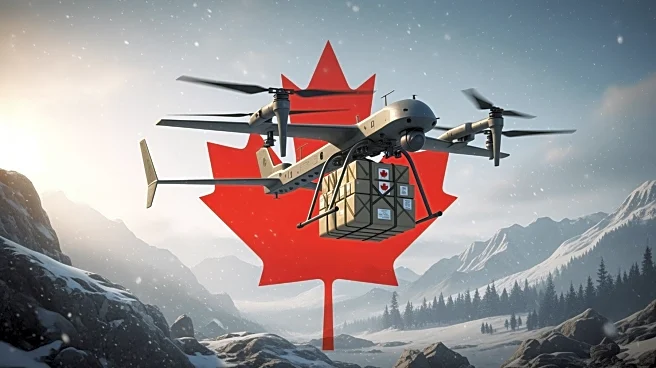What's Happening?
Retired Lieutenant General Andrew Leslie, former Commander of the Canadian Army, has called for Canada to increase its military aid to Ukraine, aligning it with the size of its economy. Leslie expressed
dissatisfaction with Canada's current level of support, noting that despite having a population of 40 million and an economy exceeding $2 trillion, Canada is not among the leading nations in terms of arms delivery to Ukraine. He highlighted the need for Canada to produce 155 mm artillery shells, a capability that was lost when a factory was closed several years ago. Since Russia's full-scale invasion, Canada has provided over $16 billion in various forms of aid to Ukraine, including financial, humanitarian, and military support. Leslie urges the Canadian government to enhance its defense potential and strengthen international partnerships with Ukraine and its allies.
Why It's Important?
The call for increased military aid and ammunition production is significant as it underscores the need for Canada to play a more prominent role in supporting Ukraine amidst ongoing conflict. Enhancing military support could bolster Ukraine's defense capabilities and contribute to the broader international effort to counter Russian aggression. This move could also strengthen Canada's geopolitical standing and its relationships with NATO allies. The production of 155 mm artillery shells is particularly crucial, as these are vital for Ukraine's military operations. By ramping up production, Canada could ensure a steady supply of critical ammunition, thereby supporting Ukraine's defense strategy more effectively.
What's Next?
If Canada decides to heed Leslie's call, the government may need to invest in reopening or establishing new production facilities for artillery shells. This would involve strategic planning and allocation of resources to boost manufacturing capabilities. Additionally, Canada might engage in diplomatic discussions with Ukraine and other allies to coordinate increased military support. The Canadian government could also face domestic debates regarding defense spending and international involvement, potentially influencing future policy decisions. Monitoring the situation closely, stakeholders will likely assess the impact of any increased aid on the conflict's dynamics and Canada's international relations.
Beyond the Headlines
The push for increased military aid and production capabilities raises ethical and strategic questions about Canada's role in international conflicts. It highlights the balance between national interests and global responsibilities, as well as the implications of military involvement on domestic and foreign policy. The decision to enhance military support could also influence public opinion and political discourse within Canada, potentially affecting future elections and government priorities.








